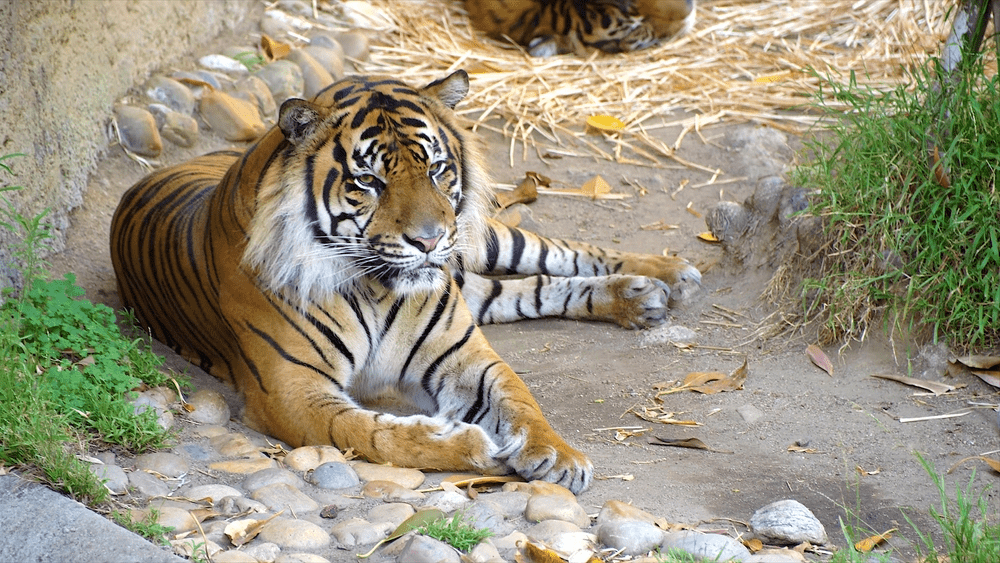When it comes to how many hours tigers sleep, the answer is not a simple one. Tigers can sleep for anywhere from two to 20 hours in a day, depending on their age, health, and lifestyle.
Young tigers typically sleep more than adult tigers, and tigers who have a lot of freedom to roam will sleep less than those who are confined to a small area.
Table of Contents
Main stages Of Sleep in a Tiger
There are three main stages of sleep that tigers go through light sleep, deep sleep, and REM (rapid eye movement) sleep.
- Light sleep is the stage where a tiger can easily be awakened.
- Deep sleep is the stage where a tiger is more difficult to wake up.
- REM sleep is when a tiger dreams, and during this stage, their brain waves are similar to those of humans.
Tigers usually sleep for short periods of time during the day, and they will often take a few naps in between hunting and eating. When it comes to how much sleep tigers need, it really varies depending on the individual tiger. Some tigers can function just fine with only a few hours of sleep, while others need a full day of rest.
Read Also: What does a jaguar eat
Some interesting facts about tigers

- Tigers are listed as an endangered species by the International Union for Conservation of Nature (IUCN).
- Tigers are the largest members of the cat family.
- Tigers can weigh up to 660 pounds.
- In the wild, tigers typically live for about 15 years.
- Tigers are solitary animals and they typically live and hunt alone.
- Tigers are very powerful and they can run up to 35 miles per hour.
- The largest tiger subspecies is the Siberian tiger while the smallest is the Sumatran tiger.
- There are six different subspecies of tigers: Bengal, Siberian, Sumatran, Malayan, Indochinese, and South China.
- The tiger is the national animal of India, Bangladesh, Malaysia, and South Korea.
- There are an estimated 3000-4000 tigers left in the wild.
- The population of wild tigers has declined by about 95% over the last century.
- Habitat loss, hunting, and poaching are the main threats to tiger populations around the world.
Are Tigers fond of sleeping?
Yes, Tigers are fond of sleeping. They do not necessarily have any specific spot for sleeping and often just bed down where they happen to be when they are ready to doze off. Tigers usually sleep for about 16 hours each day.
Why do Tigers roll up?
Tigers are one of the many animals that use mud as camouflage. Rolling in the mud not only cools them down but also helps to keep their fur clean and free from parasites. It is thought that tigers roll in the mud as a form of self-care and relaxation.
Why do tigers sleep for long hours?

There are the following reasons why do tigers sleep for long hours:
- Tigers are nocturnal animals. They are active at night and sleep during the day.
- Tigers need to conserve their energy. Sleep is a way for them to do this.
- Tigers need to be alert and ready to hunt at a moment’s notice. Sleeping for long hours helps them to be rested and ready to go.
Importance of sleeping for long hours in tigers
Sleeping for long hours is very important for tigers because it helps them to stay healthy and fit. It also helps tigers to heal their wounds quickly. So if you see a tiger sleeping, don’t disturb it! Let the tiger sleep peacefully.
Why are Tigers more active at night than during the day?
Tigers may be more active at night than during the day. Because tigers hunt primarily during the hours of darkness. Additionally, tigers tend to avoid areas where there is a lot of human activity, and since people are most active during daylight hours.
Which animal sleeps the longest?
The longest sleeping mammal is the koala, which can sleep up to 22 hours a day. But how does this compare to other animals? It turns out that tigers are among the heaviest sleepers in the animal kingdom. That means that they spend around two-thirds of their lives asleep.
Why do tigers yawn?

Well, there are a few theories. For one, it could simply be a way to release built-up tension or energy. After all, tigers are constantly on the prowl for their next meal, and that can be pretty stressful.
Yawning might also help them to stay alert and focused during those long hours of rest. Whatever the reason, it’s clear that tigers need their beauty sleep! So next time you see one yawning, just know that it’s not being rude – it’s just taking a little cat nap.
Read Also: When Did the Tasmanian Tiger Go Extinct





